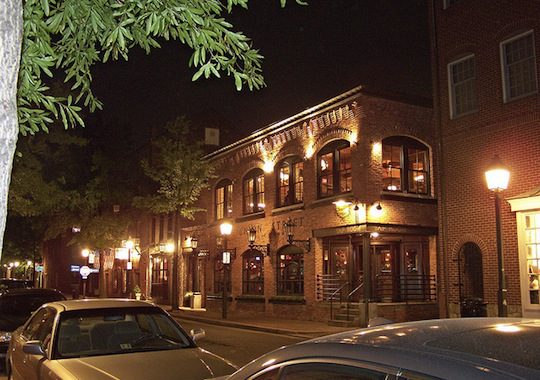Old Town Dies a Little Death

The City Council of Alexandria, VA reaffirmed its plan last Saturday to develop the waterfront on the west bank of the Potomac. The vote reapproved zoning and density changes, and in addition removed language in the city’s zoning ordinance that formerly allowed residents who would be most affected by the zoning changes to force a supermajority vote of 6-1 to have them approved.
The complex three-year legal fight over the plan between the council and a large number of Old Town residents has ranged across several city bureaus, private clubs and businesses, in council and mayoral elections, and up to the Supreme Court of Virginia. At stake is the nature of Old Town, and by extension, the city—whether it will be primarily a neighborhood enjoyed by its residents, or a destination exhibited to tourists as a haven of pleasure and nostalgia. Two new hotels are to be allowed, the profits distributed between the developers and the city treasury, with public land along the waterfront to be improved as compensation to the locals.
The lynchpin of the original design is a pier jutting out from a new public park, situated on what is currently the parking lot of the Old Dominion Boat Club, in existence since 1880. The Alexandria Planning Director said of it, “”The King Street pier is the soul of the plan.” The ODBC holds some of the best real-estate in the entire country, on the Potomac at the foot of King Street, the main artery of the town’s commerce and administration. It’s a bastion of leisure and friendship for the long-time residents of the town, many of whom were born in the town of parents who made it prosperous in the 1950s. Though negotiations between the city and ODBC to sell the ratty-looking parking lot broke down in 2010, the city has not given up the hope of acquiring the land. It has pressed on the Boat Club’s domain by forcibly sharing its old easement right-of-way in an alley parallel to King Street with a new organic restaurant Virtue Feed & Grain, and defending its decision against the club’s appeal in a costly court case. It remains unclear whether the city will try to take the parking lot under eminent domain law, and also unclear whether the amendment to the Virginia State constitution approved in the November elections, heavily restricting eminent domain action, is sufficient to protect the parking lot.
Roger Scruton was able to say in 2009 that Old Town Alexandria, along with Georgetown, exhibits a benign adaptation between architectural beauty and human needs which has survived decades of a national culture of modernist urban planning. Clearly the waterfront redevelopment won’t bulldoze the narrow streets, elaborate Georgian brickwork, and jumbled mix of homes and businesses which support a network of friendships and local loyalties. Indeed, there is a good argument for opening up the waterfront to more local residents. Large portions of it are ugly and disused. It’s still possible that the details of the development could be integrated in a wholesome manner with the rest of the town’s aesthetic character.
But that will take personal discipline and restraint from its council members, where formerly that restraint was imposed by the law. Most worrisome from Saturday was the vote to sweep away the power of residents to petition for changes in zoning regulations. The council takes the view that it isn’t a change but a clarification of an earlier ambiguity: The right of petition, it holds, is against map changes only, not the wording of regulations.
Speaking from personal experience, since I work part-time as a barista at the Grape & Bean, a wine and coffee bar in Old Town, those who oppose the redevelopment are most likely to voice their thoughts in public, and most likely, it seems, to possess the keen emotions of civic piety. Those in favor have not voiced their opinions, if they have them, except to vote overwhelmingly for those council members who ran under the Democratic Party ticket. All six took the six open council seats, defeating the three Republicans, two Independents, and one Libertarian who ran against them, two of whom were incumbents, and five of whom opposed the redevelopment as planned. There is no doubt the election was affected by the decision of the council, taken in 2009, to move the traditional local election date from May to November to coincide with the general election, and to take advantage of the turnout of voters who have no opinion on and little stake in the results of local politics. The argument over the redevelopment isn’t cleanly split by party—the one dissenting vote on the recent council vote comes from Democrat Vice Mayor Allison Silberberg, who explicitly ran against the plan. But none of the other members were interested in her compromise offer to reduce the number of hotels planned from two to one.
Beautiful civic life takes decades and centuries to create, and a few years to destroy. The sobering lesson in this story is that even the most determined conservators, if in a democratic constitutional order remain a small minority of the population, are unable to prevent the degradation of civic beauty.
Comments